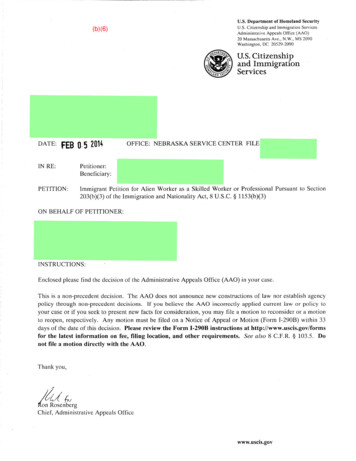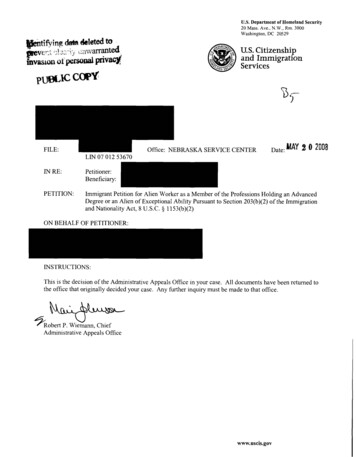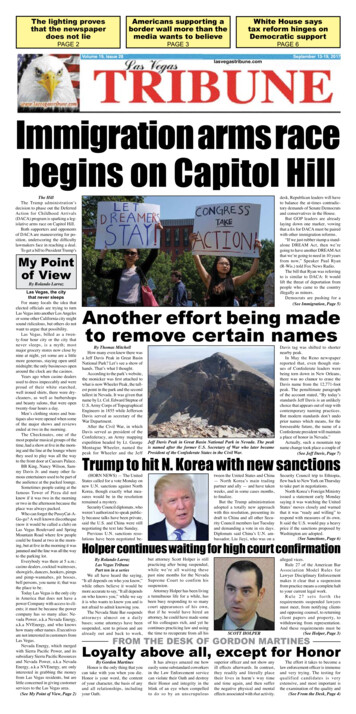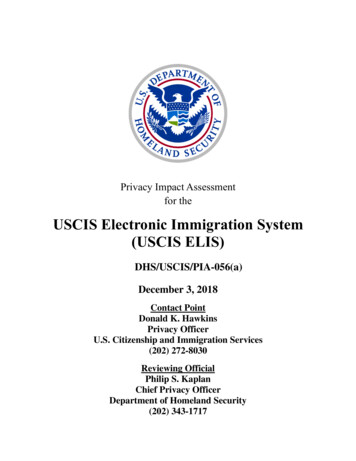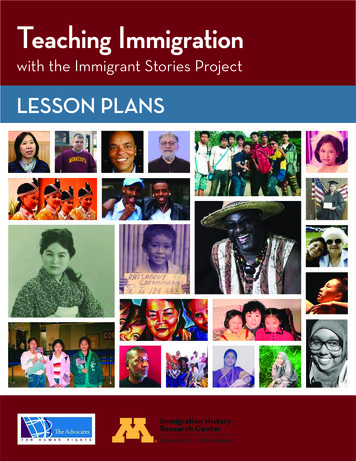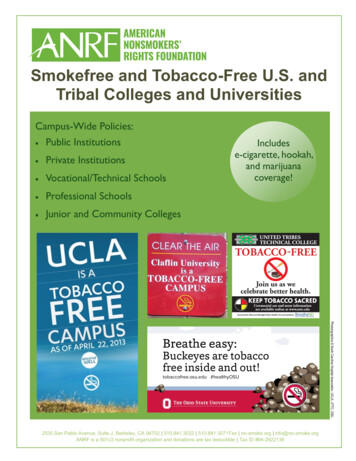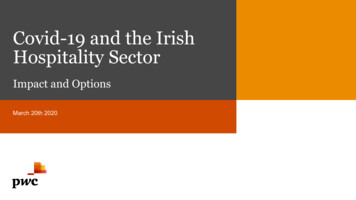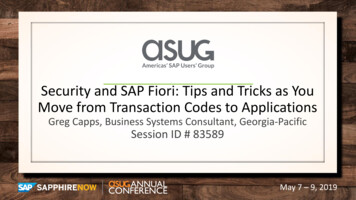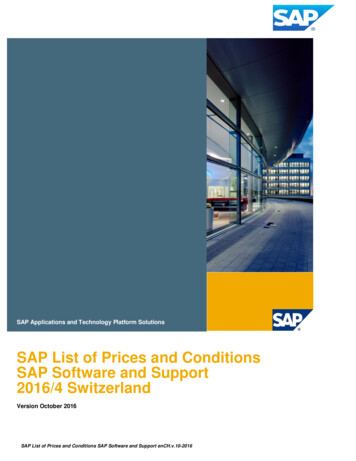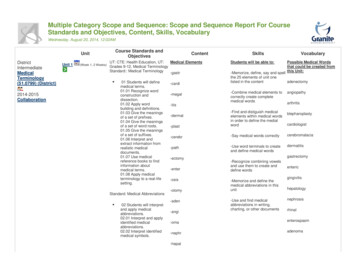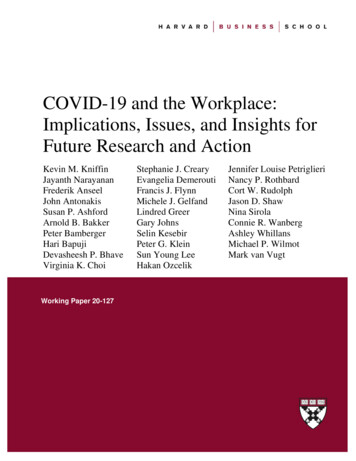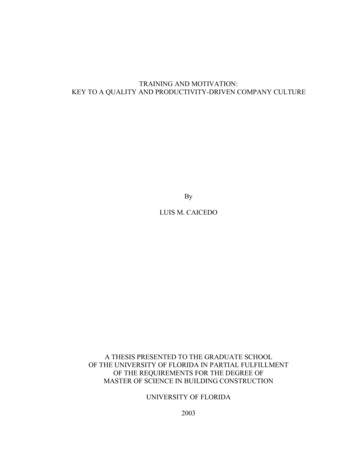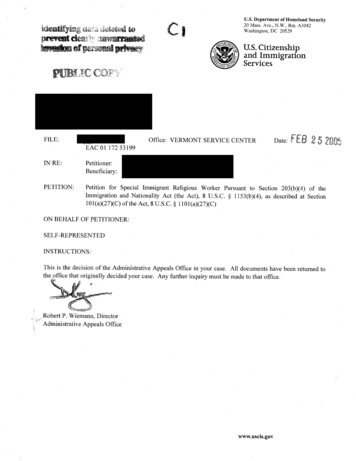
Transcription
U.S. Department of Homeland SecurityC20 Mass Ave., N.W , Rm. A3042Washington. D C 20529U.S. CitizenshipFILE:-and ImmigrationOffice: VERMONT SERVICE CENTERDate:FEB 2 5 ;60&EAC 01 172 53199PETITION:Petition for Special Immigrant Religious Worker Pursuant to Section 203(b)(4) of theImmigration and Nationality Act (the Act), 8 U.S.C. 5 1153(b)(4), as described at SectionlOl(a)(27)(C) of the Act, 8 U.S.C. 8 1101(a)(27)(C)ON BEHALF OF PETITIONER:SELF-REPRESENTEDINSTRUCTIONS:This is the decision of the Administrative Appeals Office in your case. All documents have been returned tothe office that originally decided your case. Any further inquiry must be made to that office.-. J Robert P. Wiemann, Director"iAdministrative Appeals Office
DISCUSSION: The employment-based immigrant visa petition was denied by the Director, Vermont ServiceCenter, and is now before the Administrative Appeals Office (AAO) on appeal. The appeal will be dismissed.The petitioner is a church. It seeks to classify the beneficiary as a special immigrant religious worker pursuantto section 203(b)(4) of the Immigration and Nationality Act (the Act), 8 U.S.C. § 1153(b)(4), to performservices as a religious worker. The director determined that the petitioner had not established that the positionqualified as that of a religious worker.On appeal, the petitioner submits additional documentation.'Section 203(b)(4) of the Act provides classification to qualified special immigrant religious workers asdescribed in section 101(a)(27)(C) of the Act, 8 U.S.C. 5 1101(a)(27)(C), which pertains to an immigrantwho:(i) for at least 2 years immediately preceding the time of application for admission, hasbeen a member of a religious denomination having a bona fide nonprofit, religiousorganization in the United States;(ii) seeks to enter the United States-(I) solely for the purpose of carrying on th.e vocation of a minister of that religiousdenomination,(11) before October 1, 2008, in order to work for the organization at the request ofthe organization in a professional capacity in a religious vocation or occupation, or(111) before October 1, 2008, in order to work for the organization (or for a bonafide organization which is affiliated with the religious denomination and is exemptfrom taxation as an organization described in section 501(c)(3) of the InternalRevenue Code of 1986) at the request of the organization in a religious vocation oroccupation; and(iii) has been carrying on such vocation, professional work, or other work continuously forat least the 2-year period described in clause (i).The regulation at 8 C.F.R. 5 204.5(m)(1) echoes the above statutory language, and states, in pertinent part, that"[aln alien, or any person in behalf of the alien, may file a Form 1-360 visa petition for classification undersection 203(b)(4) of the Act as a section 101(a)(27)(C) special immigrant religious worker. Such a petition maybe filed by or for an alien, who (either abroad or in the United States) for at least the two years immediatelypreceding the filing of the petition has been a member of a religious denomination which has a bona fidenonprofit religious organization in the United States." The regulation indicates that the "religious workers must' Although the record contains a letter from an a t t o r n e y , who purports to represent the petitioner onappeal, the attorney failed to submit a Form G-28, Notice of Entry of Appearance as Attorney or Representative.
Page 3have been performing the vocation, professional work, or other work continuously (either abroad or in the UnitedStates) for at least the two-year period immediately preceding the filing of the petition."According to 8 C.F.R. Lj 204.5(m)(l), the alien must be coming to the United States at the request of thereligious organization to work in a religious occupation.We note that, in the initial stages of these proceedings, the petitioner failed to identify the specific positionthat it was offering to the beneficiary. In letters dated March 19, 2002 and March 27, 2002, Reverend PierreDaniel Eloi, the petitioner's senior pastor, stated:[The beneficiary's] duties at [the petitioner] are numerous. First, he assists the church'ssecretary. As an assistant secretary, [the beneficiary's] duties include bokeeping, filing and other related duties. He is also the Vice-Presidentministry within the [petitioning organization] for married men. As thPresident, he plans meetings, oversees the group's budget, mentors spiritual discipline.Finally, [the beneficiary] is a member of the pastor's Ministerial Corps. This group iscomposed of a selected few who are sanctioned by the pastoral staff to perform "priestlyduties" on Sunday mornings such as leading the worship service and sermonizing.To establish eligibility for special immigrant classification, the petitioner must establish that the specific positionthat it is offering qualifies as a religous occupation as defined in these proceedings. The statute is silent on whatconstitutes a "religious occupation" and the regulation states only that it is an activity relating to a traditionalreligious function. The regulation does not define the term "traditional religious fbnction" and instead provides abrief list of examples. The list reveals that not all employees of a religious organization are considered to beengaged in a religious occupation for the purpose of special immigrant classification. The regulation states thatpositions such as cantor, missionary, or religious instructor are examples of qualifying religious occupations.Persons in such positions would reasonably be expected to perform services directly related to the creed andpractice of the religion. The regulation reflects that nonqualifying positions are those whose duties are primarilyadministrative or secular in nature. The lists of qualifying and nonqualifying occupations derive from thelegislative history. H.R. Rpt. 101-723, at 75 (Sept. 19, 1990).Citizenship and Immigration Services (CIS) therefore interprets the term "traditional religious function" to requirea demonstration that the duties of the position are directly related to the religious creed of the denomination, thatthe position is defined and recognized by the governing body of the denomination, and that the position istraditionally a permanent, full-time, salaried occupation within the denomination.evere en theAccording topetitioner erformed in a volunteer capacity for the church before becoming apaid employee in January 2002. Reveren-rtherstated:[The beneficiary's] work schedule consists of flexible hours of daily prayer, meditating, Biblereading, bookkeeping/record-keeping from Monday to Saturday with thirty minutes ofmentoring weekly, and one hour of leading/sermonizing on Sundays when applicable. Thebetter part of his days is spent in the Christian disciplines: praying two to three hours a day,reading and preparing Bible lessons three to four hours daily. He performs secretarial duties atthe end of his work hours.
Page 4allmiaily, reading the Bible and preparing forThe record does not establish that praying for two to threeBible lessons were in any way related to the duties Reverenated that the beneficiary performed. Thepetitioner provided no evidence of a typical work schedule for the beneficiary and failed to establishotherwise that he worked on a full-time basis.On the Form I-290B, Notice of Appeal to the Administrative Appeals Unit, the petitioner states that thebeneficiary's "primary duties and responsibilities are those of a religious instructor and counsellor [sic], asdefined by [8 C.F.R. 9 204.5(m)(2)]." In a letter dated July 11, 2000, submitted for the first time on appeal,the petitioner offers the beneficiary the position of deacon with the church. The petitioner describes theposition as follows:As a Deacon, you will serve the church as part of the church's "Ministerial Corps." Morespecifically, your duties will also include, but not be limited to, the following:* Provide For The Administration of Sacraments* Preside At Sunday Morning Worship Service* Sermonizing* Lead Ministry and Fellowship For Married Men* Provide Spiritual Mentoring and Counseling For The Congregation* Perform Other Priestly Duties As Needed To The Congregation and Community* Teach Sunday School* Conduct and Teach Bible Study In A Comprehensible and Systematic Manner* Provide Ministerial Training and Counseling To other Aspiring Ministers* Preside Or Assist In Presiding At All Special Services and ObservancesIn addition to your primary duties as Deacon, you will also perform various administrativeduties as needed. You will also be expected to assist in community outreach efforts.The petitioner does not resolve the conflicts in the duties or the position that it states the beneficiary holds orwill hold. It is incumbent upon the petitioner to resolve any inconsistencies in the record by independentobjective evidence. Any attempt to explain or reconcile such inconsistencies will not suffice unless thepetitioner submits competent objective evidence pointing to where the truth lies. Doubt cast on any aspect ofthe petitioner's proof may, of course, lead to a reevaluation of the reliability and sufficiency of the remainingevidence offered in support of the visa petition. Matter of Ho, 19 I&N Dec. 582, 591 (BIA 1988).Furthermore, a petitioner may not make material changes to a petition in an effort to make a deficient petitionconform to CIS requirements. See Matter oflzummi, 22 I&N Dec. 169, 176 (Assoc. Comm. 1998).The inconsistencies in the alleged duties of the proffered position and the petitioner's failure to resolve themraise doubts as to the legitimacy of the proffered position. The evidence does not establish that the profferedposition is a religious occupation within the meaning of the statute and regulation.Beyond the decision of the director, the petitioner has not established that the beneficiary had been engagedcontinuously in a qualifying religious vocation or occupation for two full years immediately preceding the filingof the petition
The regulation indicates that the "religious workers must have been performing the vocation, professional work,or other work continuously (either abroad or in the United States) for at least the two-year period immediatelypreceding the filing of the petition."The regulation at 8 C.F.R. 5 204.5(m)(3) states, in pertinent part, that each petition for a religious worker must beaccompanied by:(ii) A letter from an authorized official of the religious organization in the United Stateswhich (as applicable to the particular alien) establishes:(A) That, immediately prior to the filing of the petition, the alien has the requiredtwo years of membership in the denomination and the required two years ofexperience in the religious vocation, professional religious work, or other religiouswork.The petition was filed on April 14, 2001. Therefore, the petitioner must establish that the beneficiary wascontinuously working as a religious worker throughout the two-year period immediately preceding that date.The legislative history of the religious worker provision of the Immigration Act of 1990 states that asubstantial amount of case law had developed on religious organizations and occupations, the implicationbeing that Congress intended that this body of case law be employed in implementing the provision, with theaddition of "a number of safeguards . . . to prevent abuse." See H.R. Rep. No. 101-723, at 75 (1990).The statute states at section 101(a)(27)(C)(iii) that the religious worker must have been carrying on thereligious vocation, professional work, or other work continuously for the immediately preceding two years.Under former Schedule A (prior to the Immigration Act of 1990), a person seeking entry to perform duties fora religious organization was required to be engaged "principally" in such duties. "Principally" was defined asmore than 50 percent of the person's working time. Under prior law a minister of religion was required todemonstrate that helshe had been "continucusly" carrying on the vocation of minister for the two yearsimmediately preceding the time of application. The term "continuously" was interpreted to mean that onedid not take up any other occupation or vocation. Matter of B, 3 I&N Dec. 162 (CO 1948).Later decisions on religious workers conclude that, if the worker is to receive no salary for church work, theassumption is that helshe would be required to earn a living by obtaining other employment. Matter ofBisulca, 10 I&N Dec. 712 (Reg. Comm. 1963) and Matter of Sinha, 10 I&N Dec. 758 (Reg. Comm. 1963).The term "continuously" also is discussed in a 1980 decision where the Board of Immigration Appealsdetermined that a minister of religion was not continuously carrying on the vocation of minister when he wasa full-time student who was devoting only nine hours a week to religious duties. Matter of Varughese, 17I&N Dec. 399 (BIA 1980).In line with these past decisions and the intent of Congress, it is clear, therefore that to be continuouslycarrying on the religious work means to do so on a full-time basis. That the qualifying work should be paidemployment, not volunteering, is inherent in those past decisions which hold that, if the religious worker is
Page 6not paid, the assumption is that helshe is engaged in other, secular employment. The idea that a religiousundertaking would be unsalaried is applicable only to those in a religious vocation who in accordance withtheir vocation live in a clearly unsalaried environment, the primary examples in the regulations being nuns,monks, and religious brothers and sisters. Clearly, therefore, the qualifying two years of religious work mustbe full-time and salaried. To hold otherwise would be contrary to the intent of Congress.In the rare case where volunteer work might constitute prior qualifying experience, the petitioner mustestablish that the beneficiary, while continuously and primarily engaged in the traditional religiousoccupation, was self-sufficient or that his or her financial well being was clearly maintained by means otherthan secular employment.In addition to the inconsistencies in the duties allegedly performed by the beneficiary during the qualifyingtwo-year period, the petitioner failed to submit evidence to establish that the beneficiary was not dependentupon secular employment for his financial support. The petitioner stated that the beneficiary had worked in avolunteer capacity with the petitioner until January 2002. The petitioner submitted no evidence to establishhow the beneficiary supported himself financially during the two years prior to his employment by thebeneficiary. This deficiency constitutes an additional ground for dismissal of the appeal.The burden of proof in these proceedings rests solely with the petitioner. Section 291 of the Act, 8 U.S.C. 5 1361.The petitioner has not sustained that burden. Accordingly, the appeal will be dismissed.ORDER:The appeal is dismissed.
that it was offering to the beneficiary. In letters dated March 19, 2002 and March 27, 2002, Reverend Pierre Daniel Eloi, the petitioner's senior pastor, stated: [The beneficiary's] duties at [the petitioner] are numerous. First, he assists
